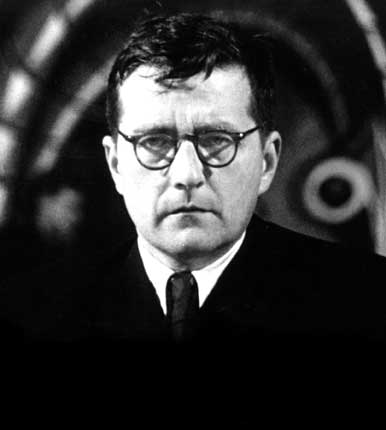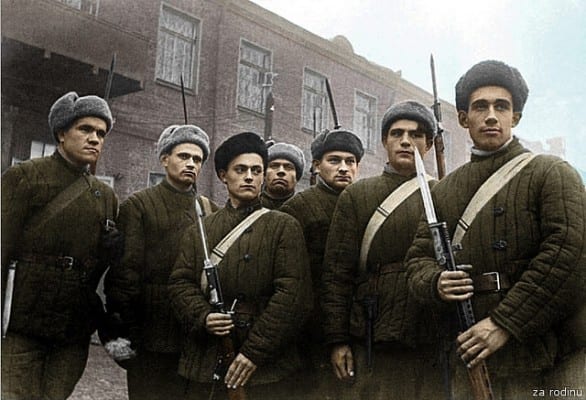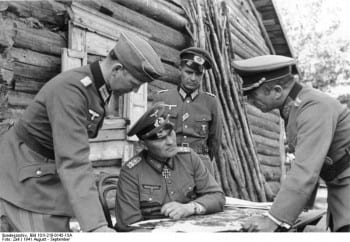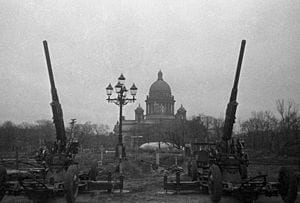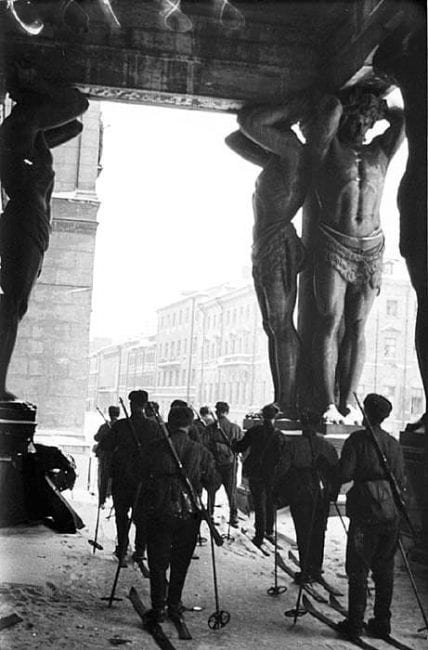SHADOWS OF SHOSTAKOVICH ‘S LENINGRAD SYMPHONY and THE DEFEAT OF NAZI GERMAN ARMIES AT THE GATES OF LENINGRAD IN WW II
GAITHER STEWART
Shostakovich.
[dropcap]A[/dropcap]s the reader will grasp I am a romanticist in the arts. In literature—also in political literature—in plastic arts, and in music. However, I am neither a painter nor a musician and unfortunately cannot play any musical instrument. Nonetheless I consider the role of music in our lives of extreme and strangely enduring significance. An echo of something. A remembrance. A reminder. A moment of our childhood. A reflection of human powers. Of people come and gone. Of places fixed in our memory.
…
In my early adult years spent in Germany I listened chiefly to the great masters of classical music. In Italy I became attached to operatic music. Both Italian and German. And I wrote stories and novels against a background of Wagner and Richard Strauss and the Italian operatic greats.
So what does this have to do with the Shostakovich of yesterday and the maligned and menaced Russia today? Even though as a rule I prefer piano or violin concertos, Chopin or Tchaikovsky, or Bruch or Beethoven, nowadays I have become fanatic about the artist Dmitri Dmitrievich Shostakovich’s magnificent Seventh Symphony, the Leningrad, dedicated to that great city on the River Neva at the head of the Gulf of Finland on the Baltic Sea. Peter the Great’s city was originally named Saint Petersburg after him, Saint Petersburg, as a “watch to the West”, was then changed to the Russian Petrograd and in 1924 to Leningrad to honor the leader of the Russian Revolution, before the name was changed again back to the original Saint Petersburg in 1991. I subsequently wrote much of my novel, Lily Pad Roll—the second of my Europe Trilogy—with the haunting Shostakovich Seventh in the background.
Here, I am attempting to link Russia’s eternal spirit with Pepe Escobar’s recent statement in his succinct analysis:
“Russian defense circles are sure of conventional and nuclear superiority on sea and land. And the Pentagon knows it. Russia would reduce NATO forces to smithereens in a matter of hours. And then would come Washington’s stark choice: accept ignominious defeat or escalate to tactical nuclear weapons…The Pentagon knows that Russia has the air and missile defense capabilities to counter anything embedded in the US Prompt Global Strike (PGS). Simultaneously though, Moscow is saying it would rather not use these capabilities. Major General Kirill Makarov, Russia’s Aerospace Defense Forces’ deputy chief, has been very clear about the PGS threat. Moscow’s December 2014 new military doctrine qualifies PGS as well as NATO’s current military build-up as the top two security threats to Russia.”
While our own editor, adds, “Fortunately for the sake of world peace, Western military adventurism is somewhat kept in check by Russia’s strategic weapons, such as the YARS MIRV missile system…and the advanced S-400 Triumph air defence missile system.”
…
[dropcap]T[/dropcap]his is indeed to be celebrated, the MAD doctrine, after all, kept the world from blowing itself up for generations. However, such military strength alone is not totally determinant in the battles of war as shown by Russia’s defeat of heavily armed and militarily far superior Nazi German armies at the very gates of Leningrad back in WWII to thwart one of history’s longest sieges. Spirit counted. In a memorable event on August 9, 1942, Dmitri Shostakovich’s Seventh Symphony was performed in the city of Leningrad as it was then named, bolstering the defenders’ will to resist to new heights. The win or die urge became decisive. Unrealistic, esoteric, old-fashioned speculation? Most assuredly not. At that dark and obscure time, the city had been besieged by invading German troops for more than a year and its inhabitants subjected to bombardment and relentless starvation. But Leningraders resisted. Will to defend the homeland and tenacity of spirit counted, as it did in the Russian defeat of Mongol, Napoleonic and Allied invaders of their lands in earlier history. The nuclear age has changed warfare but the very spirit of popular resistance will always add another dimension to the outcome.
For me Shostakovich’s great symphony expresses the deep Slavic qualities of the Russian soul and the people that account for their historical unflinching courage, their invincible and indomitable spirit down through the centuries. An orchestra of then fifteen surviving Leningrad musicians from a radio orchestra and other musicians who had been recalled from the front specifically for the occasion played the Leningrad because the Leningrad Philharmonic had been evacuated to Novosibirsk where its performance of the Seventh Symphony had already met with great success a month earlier in July of that year. (It occurs to me here that I doubt the practical and hardened revolutionary Stalin who succeeded Lenin was crazy about Shostakovich’s Jazz Suite or his, for those times, playful walzes; however the symbolism of the performance of the Leningrad must have impressed him.)
The symphony’s musical score arrived in an aircraft that flew around the German blockade to reach the besieged city. On the day of the concert, the German army began an offensive that subjected the city to heavy bombardments while reportedly the Soviet Army units in Leningrad allowed their anti-aircraft guns to remain silent for the duration of the concert and according to popular claims the music could be heard in German trenches outside the city gates. People arrived for the concert in the Great Hall of Columns in small groups, or individually, hurrying along well-known routes from the most remote parts of the city, avoiding places where notices warned of danger of artillery shelling and walls and plaster and stones and cornices were falling to the sounds of thunder from the front. The Leningradskaya Pravda newspaper reported that the concert was “stormy and passionate”—like a ceremonial occasion, grand and solemn.
After its premiere, the Leningrad triumphed in concert halls all over the world—over sixty in America, as well as in most major cities in eastern and western Europe. —and became Shostakovich’s most popular work. It was performed also in Berlin at the German State Opera in the winter of 1946-47. At the time, it received enthusiastic responses everywhere. Music critics, musicians and conductors compared Shostakovich’s Seventh Symphony to Beethoven’s Third Symphony, the Eroica, while the younger Shostakovich had dreamed of writing something better than even the motif in Beethoven’s Fifth, as motifs and notes occurred to him all his life as depicted in William T. Vollmann’s wonderful historical narration, Europe Central.
In reality, Shostakovich suffered from doubts about his political purity. Understandable in those still revolutionary and brutal times of upheaval and the construction of a new society. Even after his many successes, he too had made many ideological sacrifices along the way. No wonder his skepticism and his doubts about his loyalty since he was sometimes referred to as music’s Kandinsky who finally abandoned Soviet Russia in 1921. Compliment or warning, the latter? Fact is in reality and in the long run, Shostakovich’s Seventh was to be identified artistically with the struggle of the Soviet people against the forces of fascism.
Listening to the Leningrad today I prefer to believe he retained his doubts about a balance about his political correctness and his art, doubts that have largely gone missing in Western intellectuals, academics and journalists in the new millennia along with the moral corruptness of the political caste. Doubts we hope—though we do not really expect—will somehow be reborn and soon rise and re-flower in America like the long-lived Phoenix bird rising from the ashes.
Then after the war and perhaps because of the criticism of Leningrad by the then Soviet cultural chief, Zhdanov, for the composer’s lack of optimism and his failing to counterpose the violence of the Nazi invaders depicted in the Seventh’s first movement or to include recognition of the power of the Red Army his concerns mounted. But he resisted…
Likewise in the West, later, Shostakovich’s works and particularly the Leningrad Symphony were denounced and abandoned because they were regarded as music commissioned by Stalin. The Cold War had begun … as again today in Western criticism of President Putin and alleged “Russian aggression”. On the contrary, the US military in its ignorance and hubris has deployed at least 750 tanks and thousands of troops to Lithuania, Latvia and Estonia along their Baltic shores in order to deter what it claims to be “Russian aggression”. By contrast, cynical America induces cynical “Baltic leaders to harm their own interests,” as Joaquin Flores, Director of the Center for Syncretic Studies in Belgrade, Serbia, said in a recent interview with Press TV. Clearly any observant eye and clear mind would grasp that the real and enduring interests of the Baltic countries lie in the East and not in the European Central Bank, in the International Monetary Fund, the bureaucratic European Union and Washington. “What is strange and perhaps even criminal is the complicity of these Baltic states’ governments who are cynically engaging in a form of psychological warfare against their own people,” Flores said.
WAR
I lie in semi-obscurity on a cot near my desk to rest and reflect. I listen to the symphony’s First Movement. Things seem rosy in Leningrad even though menace hangs in the air. The German Army North is arriving. Fear and cold spread across the underlying Russian spirit of resistence.
At home, a balmy spring breeze blows gently across north Rome. In the Seventh’s Leningrad, the cold, the humidity. My house is cool and pleasant in this movement. Shostakovich’s obsessive motif dadaDAda fills me as it must other listeners somewhere in the world.
German troops are at the gate. The attack is to consist chiefly of encirclement, bombardment of the city and starvation of its 3.5 million people. Inside the city, food supplies dwindle to near zero. Artillery shells and bombs fall. Casualties mount. Birds and domestic animals have been eaten. Famine. Sickness. Rumors of cannibalism are heard as if it did not exist in the world at large. Meanwhile war rages in the world, in west Europe, on the islands of Asia. But winter Leningraders feel alone, separate from the whole. During those winters they hope to survive until summer. Summers, Leningraders long for the cold again. Bombs continue to fall. The sick and killed are hauled away on carts. Outside the gates, Germans too die from the cold. Food is nearly nonexistent. Yet within the gates, resistance persists. Resist. Resist. Resist. The Che Guevara slogan rings., Win or Die. Win or Die. Resist. Resist. Resist.
Their resistance is recorded by Shostakovich’s horns. Also the German Army North is being decimated. Victory is arriving for Leningraders. But what kind of victory? One and a half million of pre-war Leningraders gone. Softly, gently, tenderly … spokoyno, tikho like the River Don The artist Shostakovich records the saga of the epic of the siege and the ultimate victory of the Leningraders. A melancholic joy, the count and the mourning for the dead, the enormous sadness that accompanies some victories, and, as was his wont, maybe a sanf, a tender note of humane recognition for the young German dead—good or part of the wartime evil—lying under the dirt and ice outside the city gates. Survivors. 700,000 Russians while 500,000 Germans lie dead.outside the gates. The price of war paid by the victims.
Russia’s spirit burst forth in Leningrad. Never surrender. Victory is not sweet but surrender does not exist. Have modern Germans forgotten their experience at the great city’s gates? I do not believe so. Does NATO in planning the dismantling and rearranging of Russia into small vassal states understand? Does the USA grasp, even conceive of the quality of total resistance? In comparison to which one million Baltimores do not yet bear comparison.
Though for Western tourism operators the preferred nicknames of the great city of Saint Petersburg are “The Venice of the North” or “The City of White Lights” or “The Capital of Fountains”, many Russians prefer the former name of Peter the Great’s city, dropping the unrussian “Saint’ and “burg”, and calling it simply Pieter.
But for me and many of my generation the city will most certainly always bear the name of the courageous and invincible city of Leningrad.
[box] Senior Editor Gaither Stewart serves as The Greanville Post and Cyrano’s Journal Today European correspondent. A retired journalist, his latest novel is The Fifth Sun (Punto Press). He’s also the author of several other books, including the Europe Trilogy, of which the first two volumes (The Trojan Spy, Lily Pad Roll) have been published by Punto Press. These are thrillers that have been compared to the best of John le Carré, focusing on the work of Western intelligence services, the stealthy strategy of tension, and the gradual encirclement of Russia, a topic of compelling relevance in our time. He makes his home in Rome, with wife Milena. Gaither can be contacted at gaithers@greanvillepost.com. His latest assignment is as Managing Editor with the Russia Desk. [/box]
[printfriendly]
What is $5 a month to support one of the greatest publications on the Left?
